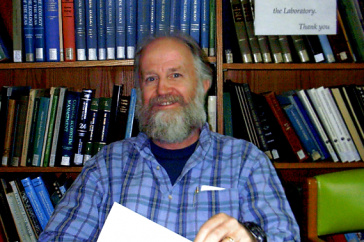UNH Professors Usher in Inaugural Science Café New Hampshire May 24

Fred Short, University of New Hampshire research professor of natural resources and the environment.
DURHAM, N.H. - Two professors at the University of New Hampshire will usher in the first meeting of the Science Café New Hampshire, monthly gatherings aimed at bringing more science into public discussion of scientific topics.
Mary Stampone, assistant professor of geography and the New Hampshire State Climatologist, and Lawrence Hamilton, professor of sociology and senior fellow at the Carsey Institute, will join Rhett Lamb, planner for the City of Keene, for the first café, "Climate Change in New Hampshire?" at 7 p.m. May 24, 2011, at The Barley House in Concord.
The panelists will give short introductions about their expertise, which will be followed by a discussion for people who want to understand the realities of climate change so they can make more well-informed decisions. The event is free and open to the public.
Hamilton's recent research found that while most Americans now agree that climate change is occurring, they disagree on why, with opinions about the cause of climate change defined by political party, not scientific understanding.
"Most people gather information about climate change not directly from scientists but indirectly, for example through news media, political activists, acquaintances, websites and other non-science sources. Their understanding reflects not simply scientific knowledge, but rather the adoption of views promoted by political or opinion leaders they follow. The responses to climate-change questions seen on recent surveys suggest that people often base their beliefs about science and physical reality on what they think might be the political implications if human-caused climate change were true," Hamilton said.
Science Café New Hampshire was created by Sarah Eck of Hopkinton, a Ph.D. in biochemistry, and Dan Marcek of Brookline, a veteran of the computer industry. They felt there was a shortage of opportunities for the general public to learn and talk about the science and engineering of controversial topics that will affect life in New Hampshire, such as climate change, digital privacy or the future of food.
"The informal atmosphere of our Science Café will allow local experts to share their research and knowledge with nonscientists and provide a comfortable environment for comments and questions to be raised and considered by all present. Additionally, we hope that the issues raised at Science Café New Hampshire will spark an ongoing discussion that extends into homes and communities," Eck said.
The monthly gatherings at The Barley House in Concord are modeled after dozens of similar gatherings run around the county and the world by universities, colleges, and professional groups.
"Science comes in many forms today, and New Hampshire needs exposure to all of them. Science Café New Hampshire will help bridge the gap, connecting science and scientists with the general public in a conversation about issues we are facing. Preparing New Hampshire for 21st century means we all must work a little harder to be informed by the facts, not the rhetoric. Public dialogue is a big part of the answer," Marcek said.
The café will be moderated by Dave Brooks, a science writer for the Nashua Telegraph, whose weekly Granite Geek column and daily Granite Geek blog have touched on many of these topics, with a lighter tone, for years.
"I'm there mainly to make sure nothing horrible happens, like somebody trying to discuss politics," Brooks said. "And if things get too slow, I'll tell my joke about the 3.14159 mathematicians who walk into a bar."
A second Science Café New Hampshire is being planned for June, on the topic of the future of food, with more monthly gatherings to take place in the fall after a summer hiatus.
To learn more about the discussion, http://www.sciencecafenh.org/. For more information, contact Dan Marcek at 603-801-6943, marcek@gmail.com or Sarah Eck 603-728-8243, sarahmeck@gmail.com
The University of New Hampshire, founded in 1866, is a world-class public research university with the feel of a New England liberal arts college. A land, sea, and space-grant university, UNH is the state's flagship public institution, enrolling 12,200 undergraduate and 2,300 graduate students.
-30-
Latest News
-
November 6, 2025
-
November 5, 2025
-
October 24, 2025
-
October 8, 2025
-
October 2, 2025
















































